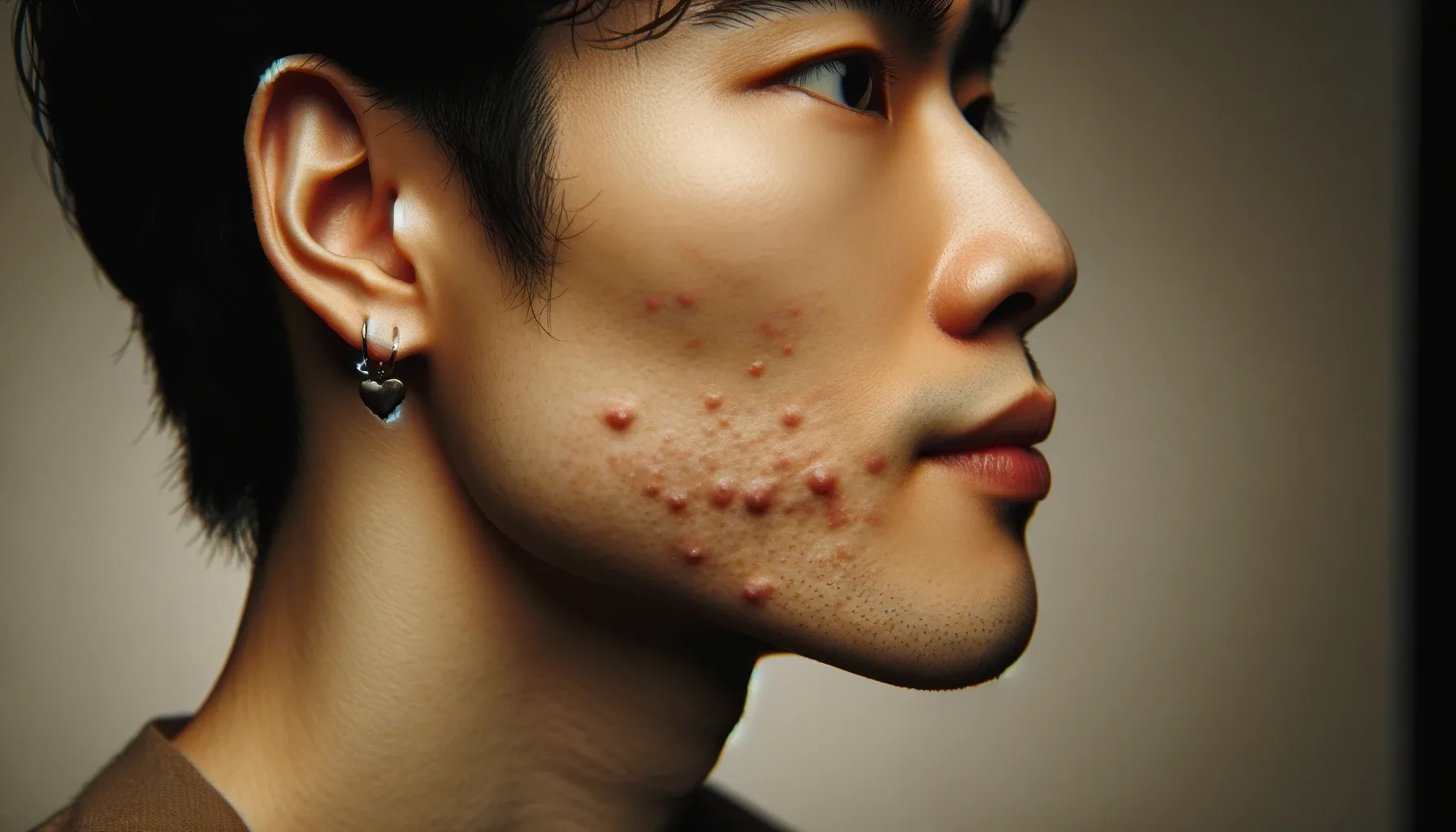Discover the Power of a Diet for Clear Skin
Have you ever considered that what you eat could be the key to achieving clear skin? The idea of a diet for clear skin isn’t new, but understanding the direct link between what we consume and how our skin appears can be eye-opening.
Many of us struggle with acne, whether it’s an occasional breakout or a more persistent condition that seems to cling no matter what remedies we try. However, emerging research suggests that a ketogenic diet, known for its low carbohydrate approach, may hold the secret to not only managing weight but also clearing up stubborn acne.
This post explores how a ketogenic diet for clear skin can potentially transform your skin’s health by delving into its effects on your body’s hormonal balance and inflammatory processes. Whether you are an acne sufferer yourself or care about someone who is battling with acne, understanding how dietary choices influence skin health could be a game-changer. Let’s dive into why the ketogenic diet might just be the diet for clear skin you’ve been searching for.
Understanding Acne and Its Causes
Acne is more than just an occasional pimple; it’s a complex skin condition that affects millions of people worldwide. It’s characterized by blackheads, whiteheads, pimples, and deeper lumps (cysts or nodules), and can appear on the face, neck, chest, back, shoulders, and even upper arms. But what causes acne? Let’s delve into the mechanics behind this prevalent skin issue.
Hormonal Fluctuations
One of the primary culprits behind acne is hormonal changes. Hormones can stimulate the skin’s oil glands to produce more sebum (oil), which can clog pores and provide a breeding ground for bacteria. This is particularly evident during puberty, pregnancy, and with certain health conditions.
Dietary Impact
What you eat influences your skin’s health. Diets high in sugars and carbohydrates can increase insulin levels and insulin-like growth factor (IGF-1), which may contribute to acne by increasing oil production and promoting skin cell turnover.
Inflammation and Bacteria
At its core, acne is an inflammatory disease. Internal factors that promote inflammation can manifest externally as acne. In addition, the presence of certain bacteria on the skin, such as Cutibacterium acnes, can worsen acne. These bacteria can trigger inflammation and lead to the development of painful, swollen acne lesions.
By understanding these factors, we can see how a diet for clear skin that addresses hormonal balance, reduces inflammation, and manages blood sugar levels might be effective in reducing or even preventing acne. This leads us to explore why the ketogenic diet could be a particularly good fit for tackling these issues head-on.
Choosing a Diet for Clear Skin
When exploring effective treatments for acne, dietary choices often come into play. Among the various diets touted for health benefits, the ketogenic diet stands out, especially when considering a diet for clear skin. But what makes the ketogenic diet different, and how can it specifically help with acne?
Low-Carbohydrate Approach
The ketogenic diet dramatically reduces carbohydrate intake, focusing instead on high fats and moderate proteins. This shift forces the body into ketosis, a metabolic state where fat is burned for energy instead of carbohydrates. The result is significantly lower insulin levels and reduced insulin spikes throughout the day.
Regulating Hormones:
By controlling insulin, a diet for clear skin like the ketogenic diet indirectly regulates other hormones related to acne. Lower insulin levels can mean less stimulation of oil glands, potentially leading to decreased sebum production—a key factor in the development of acne.
Reducing Inflammation:
A cornerstone benefit of the ketogenic diet is its potential to reduce systemic inflammation. Since acne is fundamentally an inflammatory condition, a diet that mitigates inflammation could directly impact the severity and frequency of acne breakouts.
Sustained Energy and Blood Sugar Levels:
Fluctuating blood sugar and energy levels can stress the body and exacerbate acne. The ketogenic diet stabilizes blood sugar levels, providing a more steady energy supply and reducing stress-related acne triggers.
The ketogenic diet is not just about cutting carbs; it’s about rethinking how the body’s fuel sources can influence everything from energy levels to skin health. For those seeking a diet for clear skin, understanding the ketogenic diet’s holistic impact on the body’s biological processes is crucial. It not only offers a method to manage acne but also promotes an overall healthier lifestyle, which can further enhance skin health.
Ketogenic Diet’s Impact on Hormones and Acne
The ketogenic diet’s influence on hormones plays a significant role in its potential to serve as an effective diet for clear skin. This section delves into the biological interactions that make this diet beneficial for those struggling with acne.
Insulin Regulation
One of the most critical hormonal effects of the ketogenic diet is the regulation of insulin. A standard diet high in carbohydrates can cause frequent spikes in insulin levels, which, in turn, can exacerbate acne by increasing sebum production and promoting inflammatory processes. The ketogenic diet maintains low and stable insulin levels, reducing these acne-promoting spikes.
Androgen Levels
Insulin not only affects glucose metabolism but also influences androgen hormones. High insulin levels can increase androgens, which stimulate the sebaceous glands to produce more sebum. By keeping insulin levels low, the ketogenic diet helps reduce androgen levels, subsequently decreasing sebum production and mitigating one of the primary causes of acne.
Hormonal Balance
Beyond insulin and androgens, the ketogenic diet also impacts other hormonal pathways that contribute to skin health. For example, it helps increase levels of adiponectin, a hormone that enhances cellular insulin sensitivity and possesses anti-inflammatory properties. Elevated adiponectin levels can help improve overall skin health and reduce acne severity.
Effects on Growth Factors
The ketogenic diet can decrease levels of Insulin-like Growth Factor 1 (IGF-1), a hormone that can lead to increased keratin production, potentially clogging pores and triggering acne. Lower levels of IGF-1 thus contribute to a reduction in acne breakouts.
By influencing these hormonal pathways, a ketogenic diet for clear skin not only addresses the superficial symptoms of acne but also tackles the underlying hormonal imbalances that contribute to its development. This approach provides a more sustainable and potentially effective strategy for managing and preventing acne compared to treatments that focus solely on external symptoms.
Anti-Inflammatory Benefits of the Ketogenic Diet
A crucial aspect of the ketogenic diet’s effectiveness as a diet for clear skin lies in its powerful anti-inflammatory properties. Understanding how this diet reduces inflammation can provide insights into why it may be particularly beneficial for individuals suffering from acne.

Suppression of Inflammatory Pathways
The ketogenic diet leads to the production of ketone bodies, such as β-hydroxybutyrate, which have been shown to inhibit the NLRP3 inflammasome. This inflammasome is a complex of proteins involved in the body’s inflammatory response that, when activated, can contribute to the chronic inflammation associated with acne. By suppressing this pathway, the ketogenic diet helps reduce the systemic inflammation that can exacerbate acne.
Regulation of Cytokines
Cytokines are signaling molecules that play critical roles in the immune system, including the modulation of inflammation. The ketogenic diet influences cytokine production by reducing pro-inflammatory cytokines and enhancing the production of anti-inflammatory cytokines. This shift helps decrease the overall inflammatory response in the body, including the skin, which is beneficial for reducing acne flare-ups and promoting healing.
Modulation of Immune Response
Beyond its impact on specific inflammatory molecules, the ketogenic diet also modulates the general immune response. This diet can lead to a decreased immune system reactivity to non-threatening triggers, including bacteria like Cutibacterium acnes, which is often involved in acne development. A less reactive immune system means fewer inflammatory responses in the skin, contributing to fewer and less severe acne breakouts.
Hormonal Effects and Inflammation
As discussed earlier, the ketogenic diet’s effects on insulin and other hormones also play a role in its anti-inflammatory benefits. Lower insulin levels can lead to reduced inflammatory pathways, which are often exacerbated by high sugar levels and frequent insulin spikes commonly seen in standard diets.
Overall Health Benefits
The general health improvements associated with the ketogenic diet, such as improved metabolic profile and reduced body fat, also contribute to lower levels of systemic inflammation. These benefits, in turn, can lead to improved outcomes for various inflammatory conditions, including acne.
The anti-inflammatory effects of the ketogenic diet provide a multi-faceted approach to managing acne. By reducing inflammation both at the molecular and systemic levels, the diet offers a comprehensive strategy for not only treating acne but also improving overall skin health.
How to Implement the Ketogenic Diet for Clear Skin
Implementing the ketogenic diet can be a transformative step towards achieving clear skin, but it requires careful planning and consideration to ensure it’s done healthily and sustainably. Here’s a guide to help you start and maintain a ketogenic diet that could lead to clearer skin.
Essential Foods for a Ketogenic Diet
Fats

Types of Fats: Focus on incorporating a variety of healthy fats that support skin health. These include:
Saturated Fats: Found in butter, coconut oil, and animal fats. Contrary to popular belief, when consumed in moderation within a ketogenic framework, these fats can be part of a healthy diet.
Monounsaturated Fats (MUFAs): Avocado, olive oil, and nuts like almonds and macadamia nuts are rich in MUFAs, which are known for their cardiovascular and skin health benefits.
Polyunsaturated Fats (PUFAs): Include sources like fish oil, flaxseed, and walnut oils, which contain omega-3 fatty acids. Omega-3s are anti-inflammatory, helping to reduce acne flare-ups and promote smoother, clearer skin.
Benefits: These fats not only help maintain ketosis but also enhance the absorption of fat-soluble vitamins, which are crucial for skin health.
Proteins

Proteins: Choose from numerous sources such as chicken breast, turkey, and fish like salmon, which is also high in omega-3 fatty acids.
Eggs: High in protein and vitamins, eggs are versatile and beneficial for maintaining muscle mass on a low-carb diet.
Plant-Based Proteins: For those following a vegetarian keto diet, sources like tofu and tempeh are excellent for providing necessary proteins without the carbs.
Benefits: Proteins are essential for the repair and regeneration of skin cells, and having a sufficient protein intake is crucial for healthy skin.
Vegetables

Low-Carb Vegetables: Emphasize non-starchy vegetables that are low in carbohydrates but high in fiber and nutrients. These include leafy greens such as spinach and kale, cruciferous vegetables like broccoli and cauliflower, and other greens like zucchini and asparagus.
Benefits: These vegetables provide essential vitamins and minerals that support skin health, such as Vitamin A, C, and K, and antioxidants that combat oxidative stress, a contributing factor to acne.
Dairy

Select Dairy: If dairy is included, choose high-fat options like full-fat Greek yogurt, cheese, and heavy cream, which can be used in moderation to add flavor and texture to dishes.
Benefits: Dairy can be a good source of calcium and probiotics (especially in yogurt), which support both bone and digestive health. However, some individuals may find that dairy exacerbates acne, so it’s important to monitor skin response when incorporating these products.
Nuts and Seeds

Varieties to Include: Almonds, walnuts, flaxseeds, chia seeds, and pumpkin seeds are all low in carbohydrates but high in fats.
Benefits: They are packed with vitamins, minerals, antioxidants, and fibers. Seeds like flaxseeds and chia seeds also offer omega-3 fatty acids, which are beneficial for reducing inflammation in the body and promoting skin health.
Tips for Maintaining the Diet
- Meal Planning: Plan your meals ahead to avoid the temptation of high-carb foods. Preparing your own meals can help you stay on track.
- Keto-Friendly Snacks: Keep keto-friendly snacks on hand, such as cheese, nuts, seeds, and low-carb vegetables, to help manage hunger between meals.
- Hydration and Electrolytes: Staying hydrated is crucial, especially as your body adjusts to a lower carb intake. Additionally, ensure you’re getting enough salts to balance electrolytes, which can be depleted during the initial phase of the diet.
Monitoring Your Progress
- Skin Health Journal: Keep a journal of your skin’s condition and any other health changes. This can help you track what’s working and identify any areas that need adjustment.
- Adjustments as Needed: Be willing to adjust your diet based on your skin’s response and your overall health. Keto isn’t one-size-fits-all, and personalizing your approach can lead to better results.
Sustaining the Diet
- Variety and Creativity: Keep your diet interesting by trying new keto recipes and experimenting with different foods to avoid dietary fatigue.
- Community Support: Join online forums, social media groups, or local communities that focus on ketogenic lifestyles. Support from others who are on the same journey can provide motivation and insight.
Implementing and maintaining a ketogenic diet requires dedication and can involve a significant lifestyle change. However, for many, the benefits of improved skin health, along with other health improvements, make this diet for clear skin well worth the effort.
Embrace a Ketogenic Diet for Clearer Skin
In exploring the ketogenic diet as a diet for clear skin, we’ve delved into how this dietary approach can influence hormonal balances, reduce inflammation, and provide numerous health benefits that extend beyond skin health.
Summarizing the Benefits:
- Hormonal Regulation: The ketogenic diet helps stabilize insulin and other hormones, potentially reducing acne outbreaks.
- Anti-inflammatory Effects: By lowering inflammation through biochemical changes, the diet can improve the appearance and health of your skin.
- Sustainable Health Practices: Adopting the ketogenic diet encourages a focus on whole, nutritious foods, which supports long-term health and skin clarity.
Final Thoughts
Adopting a diet for clear skin, specifically a ketogenic diet, is not a quick fix but a lifestyle change that requires commitment and adaptation. The benefits, as seen through various testimonials and scientific insights, highlight its potential not just as a temporary solution but as a sustainable approach to managing acne and promoting overall health.
By understanding and utilizing the ketogenic diet as a comprehensive strategy for health, individuals looking for a diet for clear skin can find not only cosmetic improvements but also a pathway to a healthier lifestyle. Whether you are just beginning to explore dietary solutions for acne or you are seeking to refine your approach, the ketogenic diet offers a promising and holistic avenue worth considering.
Start your journey towards healthier, clearer skin today and discover how powerful a targeted dietary approach can be in combating acne and enhancing your quality of life.
Share Your Story
We invite you to share your experiences or thoughts on using a ketogenic diet for clear skin. Please leave a comment; your journey could inspire others and provide valuable insights into the practical aspects of maintaining this diet.
References:
- Very low-calorie ketogenic diet (VLCKD): a therapeutic nutritional tool for acne? PubMed
- The Ketogenic Diet and Dermatology: A Primer on Current Literature. (PDF) MDEdge/Dermatology
- Diet and acne: A systematic review. PubMed
- Impact of Ketogenic and Low-Glycemic Diets on Inflammatory Skin Conditions. MDEdge/Dermatology
- Linking diet to acne metabolomics, inflammation, and comedogenesis: an update. Clinical, Cosmetic and Investigational Dermatology
- Dietary glycemic factors, insulin resistance, and adiponectin levels in acne vulgaris. Journal of the American Academy of Dermatology
- What’s Diet Got to Do With It? Basic and Clinical Science Behind Diet and Acne. MDEdge/Dermatology

